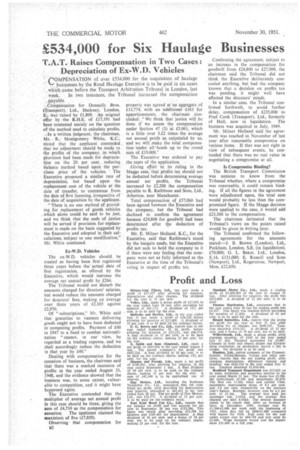£534,000 for Six Haulage Businesses
Page 36

If you've noticed an error in this article please click here to report it so we can fix it.
T.A.T., Raises Compensation. in Two Cases : Depreciation of Ex-W. D. Vehicles
CONIPENSATION of over £534,000 for the acquisition of haulage businesses by the Road Haulage Executive is to be paid in six.cases whiah, came before the Transport Arbitration Tribunal in London, last week. In two instances, the Tribunal increased the conipensation.
payable.
Compensation for Donnelly Bros. (Transport), Ltd., Hackney, London, E., was raised by £1,809. An original offer by the R.H.E. of £17,191 had been contested mainly on the question of the method used to calculate profits.
a written judgment, the chairman, Mr. R'. Montgomery White, K.C., stated that the applicant contended that no adjustment should be made to the profits of the company, in, which provision had been made for depreciation on the 20 per cent, reducing balance method based upon the purchase price of the vehicles. ' The Executive proposed a similar rate of depreciation, but based upon the replacement cost of the vehicle at the date of transfer, to commence from the date of first licensing, irrespective of the date of acquisition by the applicant.
"There is no one method of providing for replacement of goods vehicles . which alone could he said to be just, and we think that the ends of justice will be served if provision forreplacement is made on the basis suggested by the Executive and adopted in their calculations, subject to one modification," Mr. White continued.
Ex-W.D. Vehicles The ex-W.D. vehicles should be treated as having been first registered three years before the• actual date of first registration, as offered by the Executive, which would increase the 'average net annual profit by £264.
The Tribunal would not disturb the amounts charged for directors' salaries, but would reduce the amounts charged for directors' fees, making an average over three years of £2,103 against £2,970.
Of "subscriptions," Mr. White said that gratuities to vanmen delivering goods ought not to have been deducted in computing profits. Payment of £40 in 1947 to a fund to combat nationalization " cannot, in our view, be regarded as a trading expense, and we shall accordingly reduce the deduction in that year by £40."
Dealing with compensation for the cessation of business, the chairman said that there was a marked recession of profits in the year ended August 31, 1948, and the evidence showed that the business was, to some extent, vulnerable to competition, and it might have happened again.
The Executive contended that the multiplier of average net annual profit in this case should be three, giving the sum of £4,710 as the compensation for cessation., The applicant claimed the maxinium. of 'five (£7,850).
Observing' that compensation for B2
property was agreed at 'an aggregate. 'of £13,774, with an -additional £165 for apportionments, the chairman :Concluded: "We think that justice will be done if we. assess the compensation under Section 47(3) it £5,061, which is a little over 3:22 times' the average net annual profit 'as -calculated. by us, and we will ,make the total compensation under all-heads up to the' round
sum of £19,000.'.' . . . . . , The Executive was ordered to pay the costs of the application. : Giving effect to its ruling in the Maggs case, that profits tax should not be deducted before determining average annual net profits, the Tribunal increased by £2,200 the compensation payable to R. Rathbone and Sons, Ltd., Atherton, near Manchester.
Total compensation of £57,060 had been agreed between the Executive and the company, but the Tribunal had declined to confirm the agreement because £24,800 for goodwill had been determined after the deduction of profits tax.
Mr. E. Milner Holland, K.C., for the Executive, said that Rathbone's. stood by the bargain made, but the Executive did not seek to hold the company to it if there were any feeling that the company were not as fully informed as the Executive at the time of the Tribunal's ruling in respect of profits tax,
Confirming the agreement, subject to an increase in the compensation for goodwill from £24,800 to £27,000, the chairman said the Tribunal did not think the Executive deliberately concealed anything, but had the company known that a decision on profits tax was pending, it might well have affected the directors' minds.
In a similar case, the Tribunal confirmed forthwith, to avoid further delay, compensation of £235,000 to Fred Cook (Transport), Ltd., formerly of Hull, now in liquidation. The business was acquired in July, 1949.
Mr. Milner Holland said the agreement was reached in November of last year after reasonable compromise on various items. If that was not right in view of subsequent events, he contended that there was no real value in negotiating a compromise at all.
Is Compromise Binding?
The British Transport Corm/fission was anxious to know from the Tribunal whether, where a compromise was reasonable, it _could remain binding. If all the figures in the agreement were adjudicated upon, the total sum would probably be less than the compromised figure. If the Maggs decision were applied to the case, it would add £23,300 to the compensation.
The chairman intimated that the Tribunal's views on the points raised would be given in iivriting later.
The Tribunal confirmed the following agreements for the amounts stated:—J. B. Brown (London), Ltd., Peckham, London, S.E. (in liquidation), £70,000; G. L. Baker, Ltd., London, E.14, £131,000; E. Russell and Sons (Newport), Ltd., Rogerstone, Newport, Mon, £22,650.




















































































